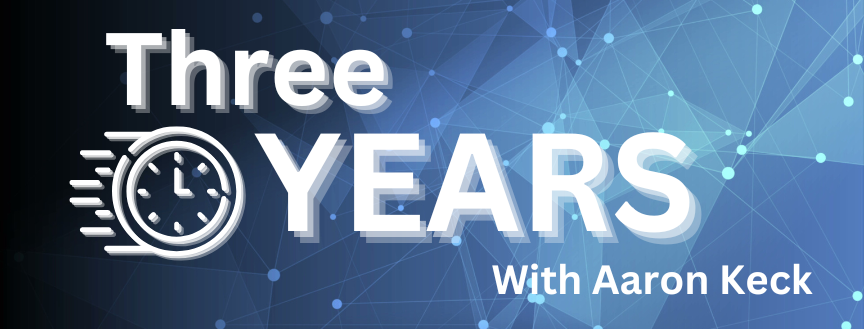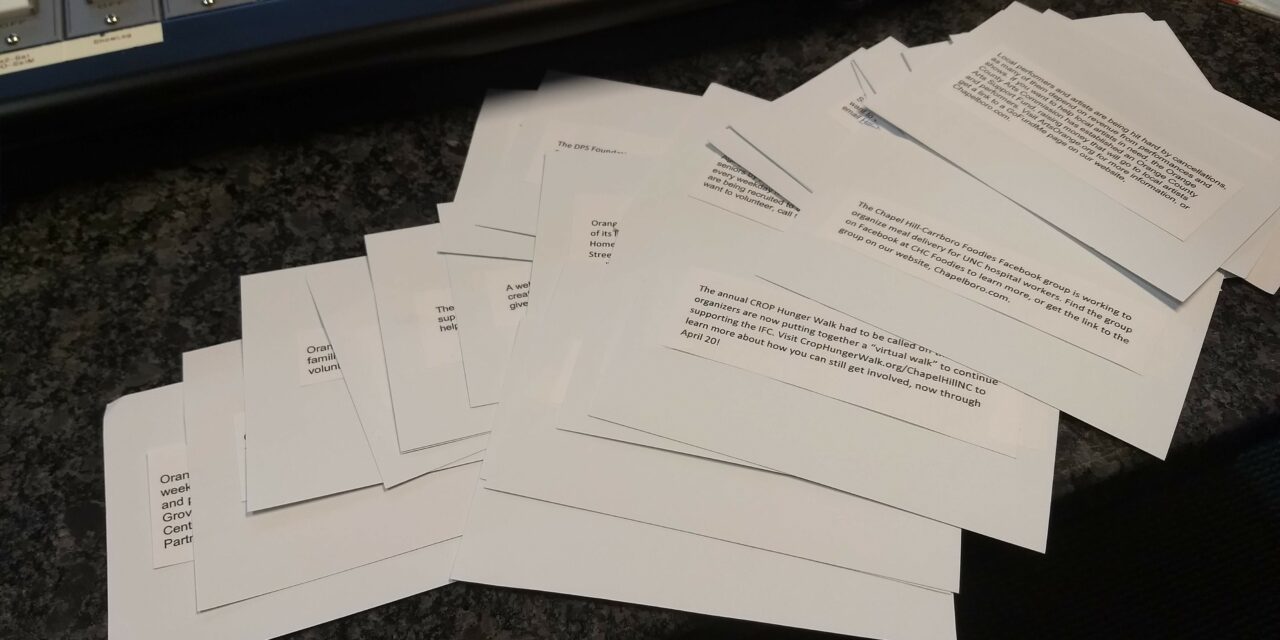In the spring of 2020, everything changed.
Everything changed first over COVID-19. People worked from home, others lost their jobs. Overnight, our plans changed. Our needs changed. And the organizations we counted on to meet those needs – they had to change as well.
And something else was happening too. The same week North Carolina closed its schools, a woman named Breonna Taylor was shot and killed by police in Louisville. Two months later, George Floyd was killed in Minneapolis. And as people flooded the streets in protest, once again, we realized things had to change.
It’s now been three years since that spring. What have we learned from our experience? What lessons have we taken away? What changes have we made? And which of those changes will last?
“Three Years” is a series by 97.9 The Hill’s Aaron Keck – looking back on our memories and lessons learned from our collective experience, drawn from conversations with numerous government officials, nonprofit heads, scholars and thought leaders in the Chapel Hill-Carrboro community.
Click here for the entire 15-part series.

Listen to Chapter 11:
Chapter 11: The Lessons
Everyone I talk to, I ask the same question: “What do you know now that you should have known before but didn’t?”
I get lots of answers.
“I (learned) how community can come together in so many different ways.”
“People’s unawareness of how other people have to live.”
“How connected we all are to each other. And that all the places where those connections are frayed are broken – we all pay for.”
“Before all of this happened, I really thought (that) in order to feel a sense of community, you had to be together in person. And I think all the ways we’ve been able to connect virtually has really taught me (that) there are ways to build community digitally.”
“Just the way that our communities are segregated – in ways that have been true for a long time, but that become more apparent when people’s needs become more apparent.”
“How close we all are from needing help. How we’re all one catastrophe or one misstep away from being in a situation where you’re like, ‘oh my gosh, I can’t feed my kids this week.’”
“Trauma brings out the best in people and the worst in people. I’m not sure what that has changed about my knowledge, but I think I have seen the spectrum of the human experience more than I have at any other point in my life.”
“You know, I’ve been aware of hurricanes and tornadoes…and I’ve got friends down east that were out of their homes for over a year. But the reality is they can hit anywhere. And everyone at once.”
So what have we learned from the last three years? I speak with dozens of local folks, and everyone offers something different.
Sometimes two different people learned things that seemed to directly contradict each other.
Jennifer Player of Habitat for Humanity, for instance, learned to make more decisions from the bottom up. “We had to do a lot more listening,” she says. “As opposed to ‘we’re going to make decisions,’ (we) let everyone else tell us, because everyone is dealing with something completely different.”
Then again, Hillsborough Mayor Jenn Weaver took the opposite lesson – about how sometimes, more decisions need to be made from the top down.
“Suddenly I’m using these emergency powers,” she says, “(and) there were many times where I would look around and say ‘I’m not sure if we should have part-time locally elected officials making these incredible public health decisions…’
“From the very beginning there was a total failure on the part of the federal government. They’re the ones that have the capacity to really do what needs to be done in a situation like a pandemic. And that just absolutely did not happen. There was just so much denial, and that cost lives.”
Trouble is, we learned a lot of little things from the pandemic – but we also learned big things. The physicist Niels Bohr once talked about the difference between ‘little truths’ and ‘great truths’: he said the opposite of a ‘little truth’ is completely false, but the opposite of a ‘great truth’ is also true. And we’ve learned a lot of great truths in the last three years, so it’s kind of hard to process.
For instance: how do you think about your time today?
“I think we’re all taking advantage of ourselves right now,” says Jamie Holcomb of Kidzu Children’s Museum. “The pandemic has tied us to our computers (like) we have never been tied before. No one thinks anymore about breaks. They’re like, ‘oh, you have a Zoom at 9:00, you can definitely have another Zoom at 10:00 and 11:00’ – and there will be days when I realize at 5:00 that I haven’t gone to the bathroom…
“Pre-pandemic, we all buzzed around, and we had lunches, and we drove in our cars, and we did all these things – and (now) we’ve changed how we value our time and our personal space, and I don’t know how we get it back. And I wish I had known that before all this, because I gave it all away.”
Does that sound familiar? Is that a great truth that applies to you? Or are you more like state poet laureate Jaki Shelton Green – who went in exactly the opposite direction?
“I try and make every moment matter,” she tells me. “I think two years ago I was more chill about it – and now (being) 68 feels really scary. It feels scarier than it did at 66. I have a lot of requests, and now I’m very, very selective about what I need to accept and not accept. (Like) me standing somewhere, holding some scissors, cutting a ribbon – to drive three hours to do that? Nice invitation, to come celebrate your new library. But that’s not as important as ‘can you come meet with a group of 5th and 6th graders tomorrow?’ So (I’m) paying attention to how I’m using time, and – we can’t control time, but (I’m) really trying to control my relationship to it.”
The lessons of COVID take us in many directions. Here’s one thing, though, that did keep coming back and back: the extent to which COVID shined a light on pre-existing socioeconomic disparities, and drove home the urgent need to address them.
“We’ve talked for several years here in Orange County about income inequality, wealth inequality,” says Carrboro Mayor Damon Seils. “I think we need to be more consistently attuned to that reality, and I think it needs to inform a lot of what we do in local government.”
In Chapel Hill, Delores Bailey of EmPOWERment, Inc. was already running a nonprofit that specifically focused on helping minority businesses and homeowners – and still found herself having to create new programs, on top of the ones that were already there.
“There’s a saying: ‘when America catches a cold, minority America catches pneumonia,’” she says. ‘Forty percent of the African-American businesses that got started, closed up during COVID. Homeowners’ mortgages were upside down by the middle of COVID, because everybody thought it was going to be over in a little bit, but that’s not what happened.”
Another lesson: even the organizations we depend on to help us in times of need are themselves susceptible to crises. We saw that in healthcare, when hospitals ran out of beds – and the demands on the schools became overwhelming too.
“We were feeding kids and their families,” says Hillary Mackenzie of the Orange County School Board. “We were providing computers and internet hotspots to anyone who needed it, which – in northern Orange (County), I think we had 2000 hotspots out.”
And even our local food banks sometimes had trouble finding food.
“My ideas about the food supply chain must have been pretty naive,” says Melissa Driver Beard of Pittsboro’s CORA Food Pantry. “So many of us take it for granted. I just thought that there would always be access to food. And when we hit March and April, (we) were looking at each other going, ‘okay, we’ve got money, we can’t buy any food.’”
But it’s not just a question of what we learned from COVID-19: it’s also a question of how long those lessons will stick. When I talk to people about that, they keep using the same word, hope – sometimes optimistically, sometimes less so.
“I hope we understand that our individual wellbeing is so closely tied to the wellbeing of everyone,” says State Representative Renee Price.
“Do you think people’s eyes are open permanently?” I ask her.
“No, no,” she laughs. “I think I’ve been around long enough to see these ebbs and flows of knowledge and awareness: it kind of dies down, and then another emergency comes up, and then we’re aware of it all over again.”
Click here for the entire 15-part series.
Featured photo: by March 24, 2020, the Chapel Hill-Carrboro community had responded to COVID-19 with an outpouring of mutual aid and support – through existing organizations as well as new ones created almost overnight. Here’s a stack of index cards announcing various new initiatives, as we tried to keep people informed on 97.9 The Hill.
Chapelboro.com does not charge subscription fees, and you can directly support our efforts in local journalism here. Want more of what you see on Chapelboro? Let us bring free local news and community information to you by signing up for our biweekly newsletter.


